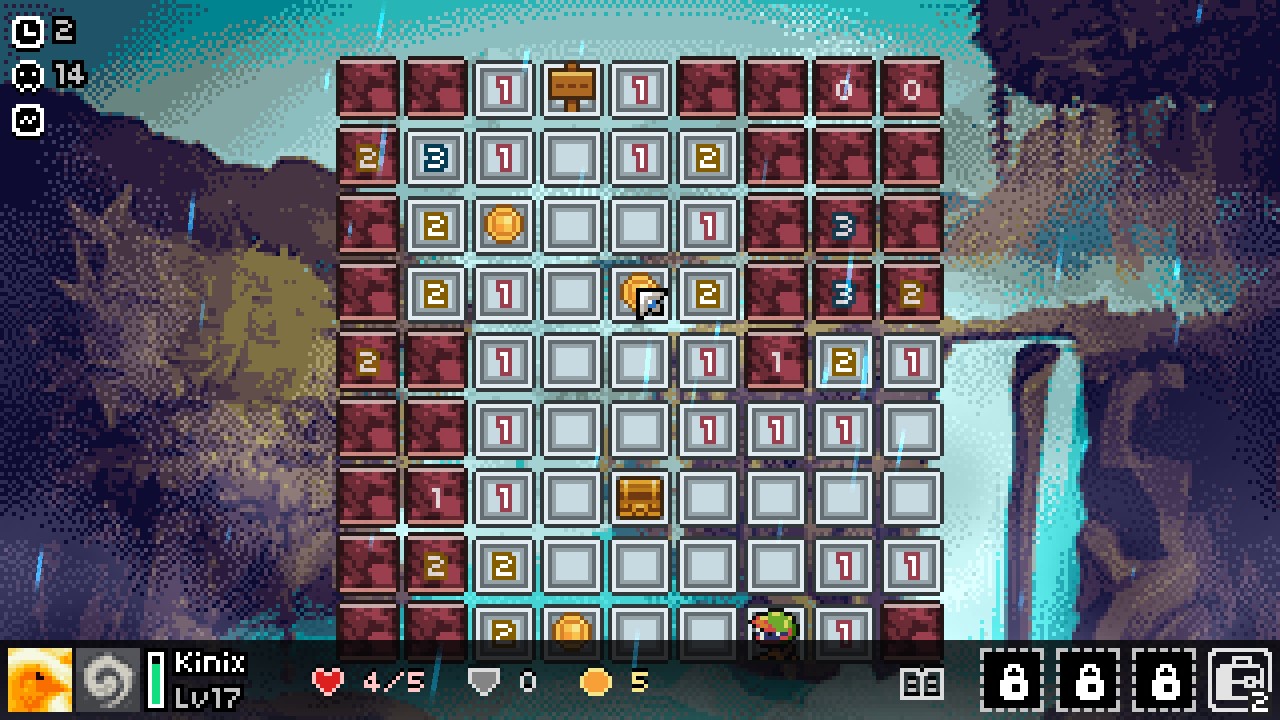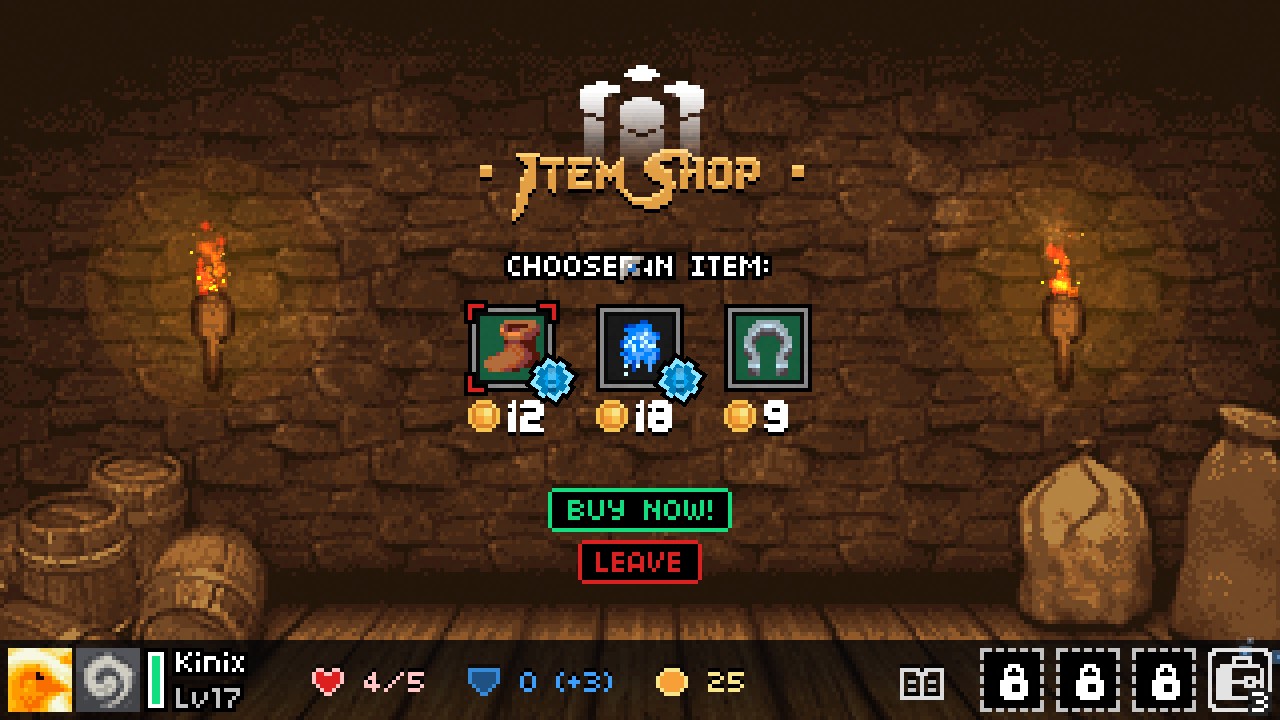Search
[{{{type}}}] {{{reason}}}
{{/data.error.root_cause}}{{{_source.title}}} {{#_source.showPrice}} {{{_source.displayPrice}}} {{/_source.showPrice}}
{{#_source.showLink}} {{/_source.showLink}} {{#_source.showDate}}{{{_source.displayDate}}}
{{/_source.showDate}}{{{_source.description}}}
{{#_source.additionalInfo}}{{#_source.additionalFields}} {{#title}} {{{label}}}: {{{title}}} {{/title}} {{/_source.additionalFields}}
{{/_source.additionalInfo}}DemonCrawl (PC)

DemonCrawl
Developed By: Therefore Games
Published By: Therefore Games
Released: November 5, 2019
Available On: Windows; Android
Genre: Strategy; rogue-lite
ESRB Rating: N/A
Number of Players: Single-player
Price: $14.99 on Steam; Free with ads on Google Play
Thanks to Therefore Games for the Steam key for review!
DemonCrawl is what happens when someone looks at Minesweeper, the classic Microsoft game about dodging mines in a minefield, and then decides to go absolutely insane with it and add a ridiculous amount of content to it. The product is a rogue-lite with over 500 unique items that takes the Minesweeper formula to completely new levels.
To begin a game of DemonCrawl you choose from 5 different quests (which are each a set of several increasingly difficult boards) and are then thrown into a randomly generated board of tiles. On your first click, you will reveal a random amount of tiles automatically. Most tiles will have numbers on them, 1-8. These numbers mean that there are a specified amount of enemies near that tile. The goal of the game is to get through each board with a limited amount of allowed mistakes. To help you get through, you can right click on an unrevealed tile to mark it unsafe. When you lose a quest in DemonCrawl, you’re sent back to square one on the first board in the set.

Strong Points: Interesting take on Minesweeper; Difficulty modifiers
Weak Points: Permadeath within quests can be off-putting
Moral Warnings: Randomly generated enemy names can be questionable; magic items; questionable characters and enemies such as priests (non-biblical) and skeletons; souls as a currency mechanic; minor violence
The rogue-lite mechanics come into play with the hundreds of different items and events you can come across. Several item types can appear such as passives that reveal tiles each turn for you, actives that can burn enemies, bad omens that hinder you, and armor. There’s such a vast selection of items that all do something different that finding them all isn’t possible unless you sink some serious time into the game. Shrines are rare events that can be found that always give a positive and negative effect. There are several NPCs that can appear to sell different types of items or help clear the board. Sometimes the board itself has random modifiers to it such as having extremely high NPC spawn rates. There are permanent upgrades you can purchase from a shop in the main menu such as legendary items and tons of cosmetic stuff. Run variety is very strong here with all these mechanics happening at once, with tons of potential synergies and lots of toys to experiment with.
One of the best things they included in a post launch update was the ability to modify the difficulty. You have 4 different settings you can toggle. The in-game timer can be turned off or on, which affects certain items, enemy count can be lowered, you can turn off the ability to find bad omens, and my personal favorite, the ability to get rid of luck-dependent situations completely. The game’s biggest issue before these modifiers were added was the rogue-lite nature colliding with the RNG of Minesweeper gameplay. Many runs used to end in frustration because of getting unlucky. The modifier makes (nearly) every single situation the game throws at you completely possible to get through with zero luck dependency and nothing but skill. With all these modifiers off, the game does become much easier, but still a challenge for newcomers.

Higher is better
(10/10 is perfect)
Game Score - 88%
Gameplay - 19/20
Graphics - 8/10
Sound - 8/10
Stability - 5/5
Controls - 4/5
Morality Score - 64%
Violence - 8/10
Language - 2/10
Sexual Content - 10/10
Occult/Supernatural - 3.5/10
Cultural/Moral/Ethical - 8.5/10
Overall polish for DemonCrawl is fantastic. The controls are as simple as it gets just requiring a mouse, and the music doesn’t have any right to be as good as it is. The pixel-art backgrounds are nice to look at and everything is easily discernible at a glance. Unfortunately, the pixelated text is a little hard to read at times and the sound effects can be annoying (NPCs each have a one-liner they say when they appear; it gets annoying after a while). I hadn’t come across any bugs or crashes during my several hours of play, and as of writing, the game gets consistent large updates and fixes.
For a game about clicking on tiles and puzzling, DemonCrawl has quite a large number of moral issues. Enemies come from a large variety of bugs, skeletons, and ogres. When an enemy dies it makes a splat sound and it explodes into pixels. You can also kill the various NPCs you find. Enemies’ names are randomly generated from a large list of words, and sometimes these words can be inappropriate such as using the word “d**n”. Names don’t show up unless you highlight over an enemy with your cursor. Magical items are found all over with mana being a core mechanic along with souls being collectable. Shrines can appear in the dungeons and you can receive bad omens. These are just things I have found from my several hours of play; there could possibly be more things I could have missed due to random generation. It’s safe to say that there are a number of questionable moral decisions to come across.
If you are okay with looking past the moral shortcomings of DemonCrawl, what you have is a very good Minesweeper-like game that’s packed with content and interesting mechanics. The price is a bit expensive on the Steam version, but I recommend the game to anybody with even slight interest in what Minesweeper has the potential to be.






